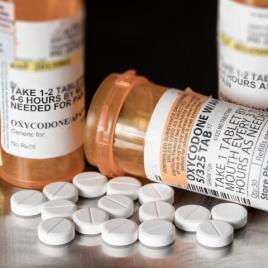DOJ Alleges That Rite Aid Dispensed Controlled Substances in Violation of CSA and False Claims Act

The Department of Justice (DOJ) is targeting another major pharmacy chain for alleged violations of the Controlled Substances Act (CSA) that purportedly helped fuel the U.S. opioid epidemic (United States ex rel. White v. Rite Aid Corp., No. 1:21-cv-01239-CDR (N.D. Ohio)).
In a March 13 complaint in intervention filed in a whistleblower suit brought in the U.S. District Court for the Northern District of Ohio, the government alleged that Rite Aid Corp. and various subsidiaries knowingly filled illicit prescriptions for controlled substances in violation of both the CSA and the federal False Claims Act.
According to the DOJ, between May 2014 and June 2019 pharmacists at Rite Aid’s more than 2,200 pharmacies in 17 states knowingly filled “at least hundreds of thousands of unlawful prescriptions for controlled substances that lacked a legitimate medical purpose, were not for a medically accepted indication, or were not issued in the usual course of professional practice.”
Details of the Government’s Allegations
“Pharmacies serve as critical gatekeepers against the unlawful dispensing of controlled substances,” the government stated in the complaint. “Because pharmacies are the last step in the supply chain before controlled substances are in the hands of individuals, the law vests pharmacies and pharmacists with important obligations to ensure that they fill only legitimate prescriptions.”
By filling “unlawful and medically unnecessary” prescriptions for oxycodone, fentanyl and other highly diverted controlled substances,” the government alleged, “Rite Aid violated its legal obligations and significantly contributed to this country’s opioid crisis.”
The allegedly unlawful prescriptions included prescriptions for “trinity” combinations of an opioid, benzodiazepine and a muscle relaxant, “desirable by drug abusers because of the increased effect of taking them together”; “early fills” of fentanyl and oxycodone before previous prescriptions had run out (“a clear sign of overutilization”); prescriptions for “extremely high doses and excessive quantities of opioids”; and prescriptions written by providers whom the company’s pharmacists “had identified as writing illegitimate prescriptions with no medically valid purpose.”
Government Affairs Department
In its complaint, the DOJ alleged that the company’s Government Affairs Department, which was responsible for ensuring the company’s compliance with federal and state laws, knew that the firm’s pharmacists filled controlled substance prescriptions “routinely and pervasively” without resolving “obvious” red flags of abuse and diversion.
“While Rite Aid pharmacists were supposed to use a validation process for certain highly diverted controlled substances and to resolve red flags before dispensing,” the complaint alleged, “Rite Aid knew the validation process was a fig leaf. And Rite Aid knew that the validation process missed numerous other commonly diverted controlled substances,” such as benzodiazepines, muscle relaxants, and stimulants like amphetamine combination products.
Specifically, the government said, Government Affairs Department personnel “disregarded (1) concerns raised repeatedly by Rite Aid pharmacists about prescribers practicing outside the usual course of professional practice; (2) dispensing data and reports that showed problematic prescribing patterns behind the prescriptions Rite Aid filled; and (3) warnings from its distributor about the amount of drugs, in particular oxycodone, ordered for outlier Rite Aid stores.”
Moreover, the DOJ said in the complaint, Government Affairs Department personnel “repeatedly directed employees in another Rite Aid department to delete in Rite Aid’s dispensing software Rite Aid pharmacists’ internal notes about suspicious prescribers, such as, ‘cash only pill mill???,’ ‘writing excessive dose[s] for oxycodone,’ and bluntly, ‘DO NOT FILL CONTROLS.’”
Rather than making sure such information was available to the company’s pharmacists, the government alleged, “a Government Affairs analyst admonished a Rite Aid pharmacist who added such a note ‘to always be very cautious of what is put in writing.’”
Even if the Government Affairs Department knew through reports from company pharmacists that a particular practitioner was prescribing controlled substances for nonlegitimate purposes, the DOJ alleged, the company “very rarely took action to stop the flow of opioids prescribed by that practitioner.” Indeed, according to the complaint, “in the vast majority of the cases, the information languished in the Government Affairs Department with no action at all by Rite Aid.”
In these ways, Rite Aid failed to meet its obligations under the CSA “and instead put profits first,” the government alleged, “filling hundreds of thousands of prescriptions for controlled substances that did not meet legal requirements.” In addition, it alleged, the company violated the False Claims Act by knowingly submitting false or fraudulent reimbursement claims to federal health care programs for those prescriptions.
“While making millions of dollars,” the DOJ alleged in the complaint, Rite Aid “opened the floodgates for millions of pills of opioids and other controlled substances to flow illegally out of their stores.”
The suit in which the government intervened was originally filed in October 2019 by three former Rite Aid pharmacy workers.
Rite Aid did not immediately respond to a request for comment.



